
Part of the Series
Gas Rush: Fracking in Depth
In mid-April, word started spreading like wildfire among Louisiana residents: Helis Oil & Gas LLC wants to drill a well in search of oil and gas on a 960-acre tract of land about 30 miles from New Orleans, in the Mandeville area.
Helis plans to use hydraulic fracturing, or fracking, to extract oil and gas from the Tuscaloosa Marine Shale (PDF), which holds an estimated 7 billion barrels of oil beneath the Southern Hills aquifer, which extends from St.Tammany to beyond Baton Rouge and well into Mississippi.
On April 16, residents packed a meeting, expressing fear and outrage about the proposed drilling. Right away, they learned two things: firstly, that they’re up against Louisiana’s strong laws protecting the oil and gas industry. And secondly, that there’s no time to waste.
On May 13, the Department of Natural Resources’ office of conservation, which regulates oil and gas drilling in Louisiana, will hold a hearing to consider issuing a unit permit — the first step in the permitting process.
Rep. Tim Burns, R-Mandeville, asked to delay the permitting process, but was denied.
“There is no legal provision to take the scheduled hearing off the docket,” Patrick Courreges, communications director for the Louisiana Department of Natural Resources, told DeSmogBlog.
As for what could prevent the permit from being issued, the short answer, according to Courreges, is geology, not the public’s concerns about fracking.
Just a couple of weeks later, there were two more meetings dealing with fracking on May 2. One was held at the Mandeville Parish Council chambers, where citizens came to support a councilman’s proposal to seek approval to hire an outside lawyer specializing in oil and gas, and the other was in Abita Springs and billed as a public “informational meeting.”
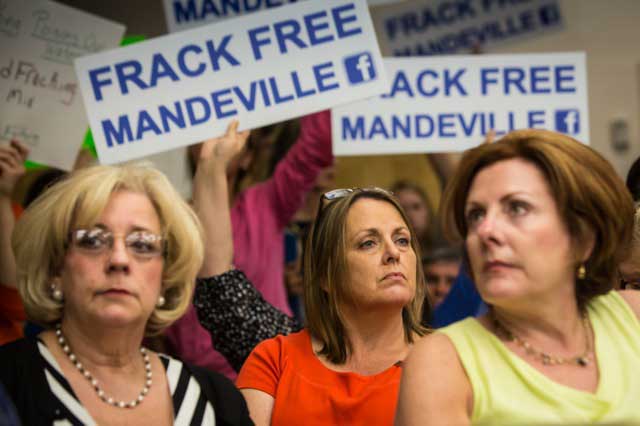 Residents opposed to fracking fill a St. Tammany Parish Council meeting in Mandeville. (Photo: ©2014 Julie Dermansky)
Residents opposed to fracking fill a St. Tammany Parish Council meeting in Mandeville. (Photo: ©2014 Julie Dermansky)
Both meetings were filled to capacity. Many in attendance had never been to a council or town hall meeting before and many who turned up had taken a crash course in fracking beforehand.
Helis Oil & Gas did not participate at either event. They did provide a local TV station with a six-page document online about its plan.
John Herasymiuk was among the St. Tammany residents who spoke during the public comment period at the council meeting. He prefaced his remarks by noting Helis has a good safety record, but added, “If the aquifer is ruined, it can’t be fixed.”
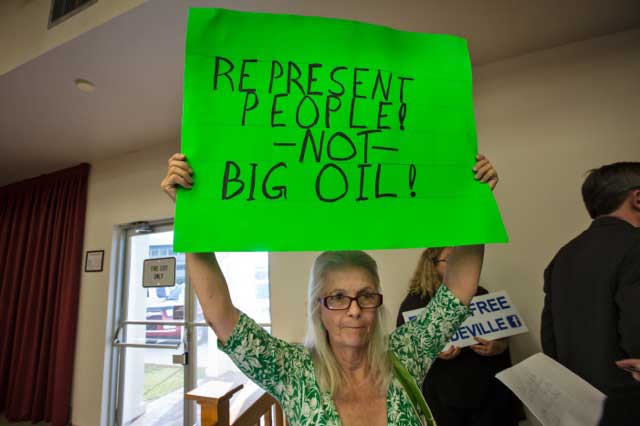 Kay Fallon at a St. Tammany Parish Council meeting. (Photo: ©2014 Julie Dermansky)
Kay Fallon at a St. Tammany Parish Council meeting. (Photo: ©2014 Julie Dermansky)
Kay Fallon brought up studies conducted by Duke University about water contamination and reports on how property values have plummeted when fracking comes into an area.
Amanda Fischer reminded the council that Abita Springs is known for its artesian aquifers (which means groundwater can be very close to the surface) and gave an impassioned plea to the council: “Fight for us with everything you have. Look on YouTube and you’ll see people light their water on fire. Do everything you can do to fight for us. That is what we want. That is why we elected y’all.”
“Local government supersedes or trumps state government when it comes to health and safety issues,” Rick Franzo, a representative of Concerned Citizens of St. Tammany, told the council.
Another citizen, Donald Lee, suggested the council consider hiring a constitutional lawyer instead of an oil and gas lawyer to help pass a civil rights ordinance so the commission could shift the legal focus from land use to civil rights.
Councilman Jake Groby explained why outside counsel was needed, “Under our Home Rule Charter, which came from our police jury powers that predate the State Constitution, there is a clause under Article 6 that says some powers are reserved to the parishes, and mostly concerning health, safety and welfare. We have one source of water. If that gets messed up, then we are definitely into the safety and welfare of the citizens.”
The council can also look to recent examples in other jurisdictions. Lawyers Helen Slottje, winner of the 2014 Goldman Environmental Prize, and her husband David have developed a legal strategy that uses zoning laws to ban fracking within a city’s borders.
In New York state, more than 170 towns and cities have banned fracking using this “home rule” strategy, which enables communities to keep out industries that pose a significant risk to air and water, regardless of state and federal laws.
Los Angeles recently passed a moratorium against fracking and a Colorado District Judge upheld a fracking ban in Broomfield, Colo. Meanwhile residents in Denton, Texas, are close to getting a fracking ban ordinance on the ballot for November.
Back at Mandeville Parish Council, Groby’s resolution passed after it was amended to include a broader search of lawyers than just those in the oil and gas industry and a $25,000-cap on any lawyer’s fee for the first month.
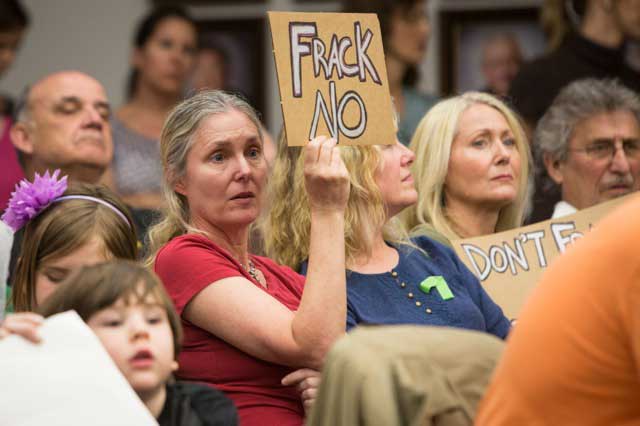 Residents fill a St.Tammany Parish Council meeting in Mandeville. (Photo: ©2014 Julie Dermansky)
Residents fill a St.Tammany Parish Council meeting in Mandeville. (Photo: ©2014 Julie Dermansky)
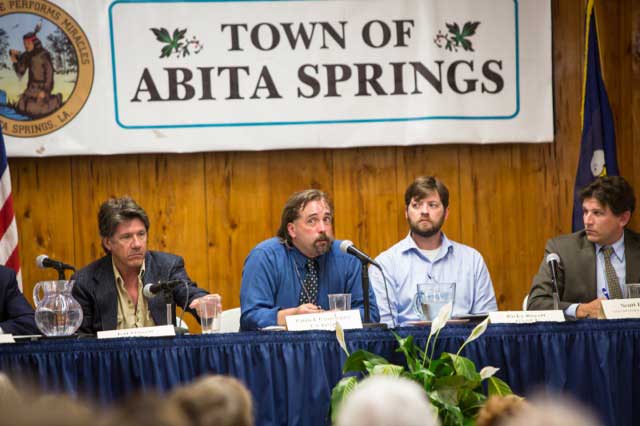 Panelist at a meeting in Abita Springs. (Photo: ©2014 Julie Dermansky)
Panelist at a meeting in Abita Springs. (Photo: ©2014 Julie Dermansky)
Meanwhile at the Abita Springs informational meeting, Sandra Slifer, president of the St. Tammany League of Women Voters, moderated a panel that included representatives from the Louisiana Oil & Gas Association, the state Department of Natural Resources, the state Department of Environmental Quality, the Gulf Restoration Network and the Lake Pontchartrain Basin Foundation.
At the start of the program, Ragan Dickens of the oil and gas association, described fracking as a safe process that does not harm the water table, pointing out that over a million wells have been fracked in the U.S. over the past 60 years. The audience hissed and snickered.
He was countered by Scott Eustis, a coastal wetlands specialist with the Gulf Restoration Network who said that St. Tammany contains the highest numbers of endangered and rare species in the state, as well as the highest number of scenic waterways, which will be threatened by the fracking industry.
The panelists were barraged with questions after the presentations. When asked what types of chemicals are used to extract the oil, Gifford Briggs of the oil and gas association said the chemicals that will most likely be used can be found “under your kitchen sink,” which also elicited jeers from the audience.
 General Russel Honoré giving a speech in Abita Springs. (Photo: ©2014 Julie Dermansky)
General Russel Honoré giving a speech in Abita Springs. (Photo: ©2014 Julie Dermansky)
Retired Army Lt. Gen. Russel Honoré, who recently formed the Green Army to help citizens fight back against industry in Louisiana, closed the Abita Springs meeting with a message of empowerment. He reminded the audience that Louisiana’s senators are in Washington doing what they can to limit the power of the EPA and weaken the Clean Air and Water Act.
Honoré then compared the fight against fracking to the American Revolution and told the audience the Green Army was with them.
“The only person who is going to save us is us,” he proclaimed. “It starts right here in St. Tammany Parrish, let the revolution start here!” he said to thunderous applause.
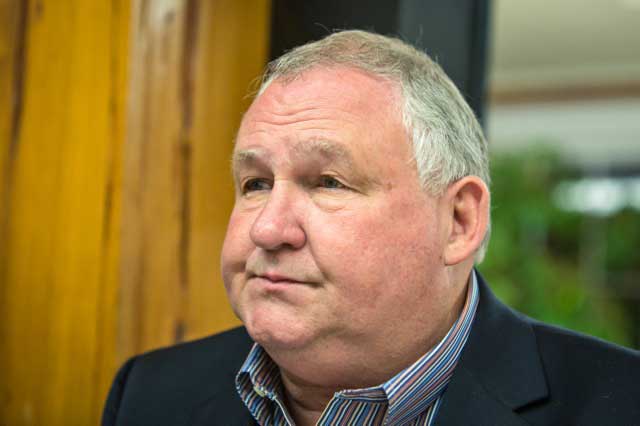 Abita Springs Mayor Greg Lemons. (Photo: ©2014 Julie Dermansky)
Abita Springs Mayor Greg Lemons. (Photo: ©2014 Julie Dermansky)
After the meeting, Abita Springs Mayor Greg Lemons told DeSmogBlog that at first, he didn’t have an opinion on fracking.
“I do now,” he said. “I’m very much in opposition to it. Most of what I heard today is very horrendous stuff. If Helis is allowed to do what it proposes on an initial 60,000 acres, we will be in the middle of Oil City.”
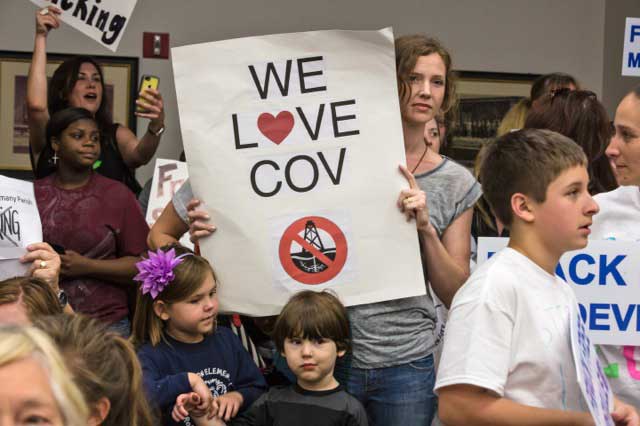 Susan Tarasova with her children at a St. Tammany council meeting. (Photo: ©2014 Julie Dermansky)
Susan Tarasova with her children at a St. Tammany council meeting. (Photo: ©2014 Julie Dermansky)
St. Tammany resident Susan Tarasova brought her kids with her to the council meeting.
“If any community can beat this, it’s St. Tammany,” she told DeSmogBlog. “As to the ‘how,’ the only way I know how to answer that right now is it must be done in a new way. Fighting against fracking is not a new fight, but this is fighting against fracking in Louisiana. It’s on a whole new level.”
Our most important fundraising appeal of the year
December is the most critical time of year for Truthout, because our nonprofit news is funded almost entirely by individual donations from readers like you. So before you navigate away, we ask that you take just a second to support Truthout with a tax-deductible donation.
This year is a little different. We are up against a far-reaching, wide-scale attack on press freedom coming from the Trump administration. 2025 was a year of frightening censorship, news industry corporate consolidation, and worsening financial conditions for progressive nonprofits across the board.
We can only resist Trump’s agenda by cultivating a strong base of support. The right-wing mediasphere is funded comfortably by billionaire owners and venture capitalist philanthropists. At Truthout, we have you.
We’ve set an ambitious target for our year-end campaign — a goal of $250,000 to keep up our fight against authoritarianism in 2026. Please take a meaningful action in this fight: make a one-time or monthly donation to Truthout before December 31. If you have the means, please dig deep.